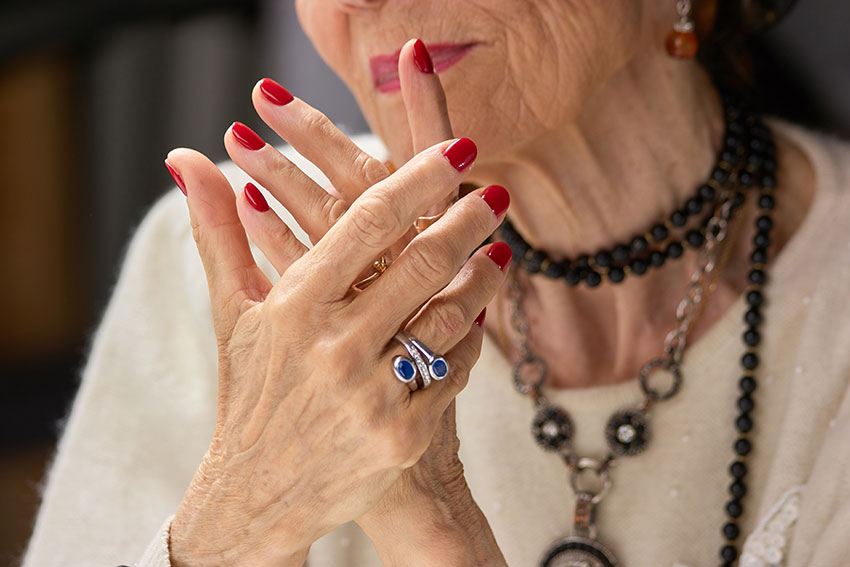As we age, our bodies go through numerous changes, and our nails are no exception. Senior adults often face unique challenges when it comes to maintaining healthy nails. From thinning and brittleness to changes in color and texture, understanding how to care for aging nails is essential for overall health and well-being. This comprehensive guide will delve into the specific needs of senior nails and provide practical tips to keep them in top condition.
Understanding the Aging Nail
Nails, like skin and hair, undergo changes as we age. These changes can be attributed to several factors, including reduced circulation, hormonal shifts, and decreased cellular regeneration. Common changes in senior nails include:
- Thinning and Brittleness: Nails may become more fragile and prone to splitting or breaking.
- Discoloration: Nails might develop yellowish or opaque hues.
- Ridges and Lines: Vertical ridges or lines on the nails can become more prominent.
- Slower Growth: Nails tend to grow more slowly with age.
- Thickening: In some cases, nails can become thicker and more difficult to trim.
Understanding these changes is the first step in adapting your nail care routine to meet the specific needs of senior nails.
Daily Nail Care Routine
Gentle Cleansing
- Use a mild soap and lukewarm water to wash your hands and nails. Avoid harsh detergents or very hot water, as they can further dry out your nails.
- Ensure thorough rinsing to remove all soap residues, which can irritate the skin and nails.
Moisturizing
- Apply a rich hand cream or nail oil regularly. Look for products containing ingredients like shea butter, vitamin E, and jojoba oil, which provide deep hydration.
- For extra nourishment, massage the moisturizer into the cuticles and nails to improve blood circulation and promote healthier nail growth.
Protective Measures
- Wear gloves when engaging in activities that expose your nails to water or chemicals, such as dishwashing or gardening.
- Use a non-acetone nail polish remover to prevent further drying of the nails.
Weekly Nail Care Tips
Trimming and Filing
- Trim your nails straight across with a nail clipper, then gently round the tips using a fine-grit nail file to prevent snagging.
- Avoid cutting the cuticles, as they protect the nail bed from infections. Instead, gently push them back with a cuticle pusher after softening them with a cuticle cream.
Soaking and Exfoliation
- Soak your nails in a bowl of warm water mixed with a few drops of essential oil for about 10 minutes to soften them.
- Exfoliate your hands and nails using a gentle scrub to remove dead skin cells and improve overall nail health.
Nail Strengthening Treatments
- Consider using a nail strengthener or hardener if your nails are particularly brittle. Look for products containing keratin or biotin, which can help fortify the nails.
- Avoid products with formaldehyde, as they can be harsh and potentially damaging.
Addressing Common Nail Problems in Seniors
Dealing with Brittleness
- Hydration: Ensure you are drinking enough water throughout the day. Dehydration can exacerbate nail brittleness.
- Diet: Incorporate foods rich in biotin, vitamin E, and omega-3 fatty acids into your diet to support nail health. Eggs, nuts, seeds, and leafy greens are excellent choices.
Managing Discoloration
- Avoid Staining: Limit the use of dark nail polishes that can stain the nails. Always use a base coat to protect your nails when applying polish.
- Consult a Professional: Persistent discoloration can sometimes indicate an underlying health issue, such as a fungal infection or nutritional deficiency. Consult a healthcare provider for an accurate diagnosis and appropriate treatment.
Treating Fungal Infections
- Hygiene: Keep your nails clean and dry. Avoid walking barefoot in public areas like pools or locker rooms to reduce the risk of fungal infections.
- Medications: Over-the-counter antifungal treatments can be effective for mild infections. For more severe cases, prescription medications may be necessary. Always consult your healthcare provider before starting any treatment.
Nail Care for Individuals with Limited Mobility
For seniors with limited mobility or dexterity issues, maintaining nail care can be particularly challenging. Here are some tips to make the process easier:
Seek Professional Help
- Regular visits to a professional manicurist or podiatrist can ensure your nails are properly cared for. These professionals can provide safe trimming, filing, and treatment for any nail issues.
Use Adaptive Tools
- There are specialized nail care tools designed for individuals with limited hand strength or dexterity. Tools with larger, easy-to-grip handles can make trimming and filing nails more manageable.
Home Assistance
- Family members or caregivers can assist with regular nail care. Ensure they are educated on proper techniques to avoid causing injury or discomfort.
Holistic Approaches to Nail Health
Taking a holistic approach to nail care can have a positive impact on overall health and well-being. Here are some additional practices to consider:
Healthy Diet
- A balanced diet rich in vitamins and minerals is crucial for nail health. Foods high in protein, biotin, and zinc support strong and healthy nails. Consider incorporating more lean meats, fish, whole grains, and fresh vegetables into your meals.
Hydration
- Staying well-hydrated is essential for maintaining nail moisture and preventing brittleness. Aim to drink at least eight glasses of water a day.
Regular Exercise
- Exercise improves blood circulation, which in turn can enhance nail health. Simple activities like walking, stretching, and gentle yoga can be beneficial.
Stress Management
- Chronic stress can negatively impact nail health. Engage in relaxation techniques such as meditation, deep breathing exercises, or hobbies that bring joy and relaxation.
The Importance of Regular Check-Ups
Regular health check-ups are important for seniors, as nail changes can sometimes be indicators of underlying health issues. If you notice significant changes in your nails, such as persistent discoloration, thickening, or severe brittleness, it is advisable to consult a healthcare provider. Conditions such as diabetes, thyroid disorders, and circulatory problems can affect nail health, and early detection is key to effective management.






0 Comments